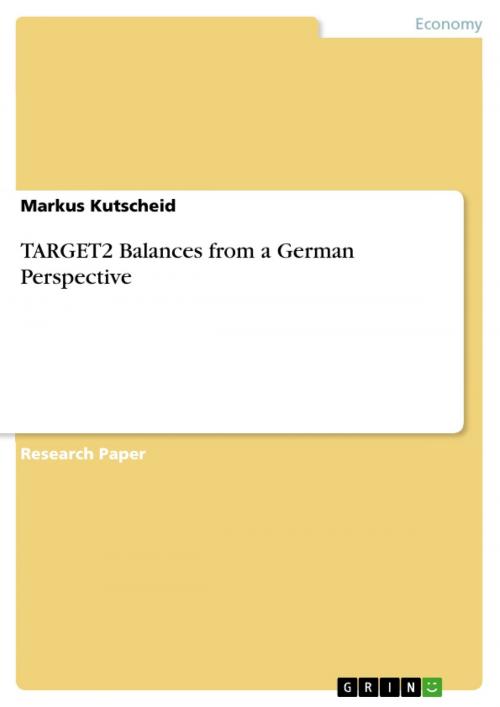| Author: | Markus Kutscheid | ISBN: | 9783656251545 |
| Publisher: | GRIN Verlag | Publication: | August 2, 2012 |
| Imprint: | GRIN Verlag | Language: | English |
| Author: | Markus Kutscheid |
| ISBN: | 9783656251545 |
| Publisher: | GRIN Verlag |
| Publication: | August 2, 2012 |
| Imprint: | GRIN Verlag |
| Language: | English |
Research Paper (postgraduate) from the year 2012 in the subject Economics - International Economic Relations, grade: keine, , course: Applied Economics, language: English, abstract: In 1999, TARGET (Trans-European Automated Real-time Gross Settlement Express Transfer System) was introduced as a payment system for the EURO. In 2007, it was replaced by TARGET2. TARGET2 serves the daily transfer of money between the participating banks. With the collapse of interbank transactions in Europe as a result of the financial crisis, the European System of Central Banks (ESCB) was forced to take action in order to assure the necessary liquidity for capital outflows and the purchases of goods between European countries. The requirements for collateral for granting bank loans have been successively reduced. This has led to a situation where the EURO system has replaced the interbank market to a large extent. The majority of cross-border financing requirements of the banks are no longer satisfied by loans made between the commercial banks of the participating countries themselves; the commercial banks in the importing countries refinance themselves through their national central banks and the cross-border payments are handled by the European Central Bank (ECB) and thus by the TARGET2 system. The national central bank of the exporting country then receives a claim against the ECB and the national central bank of the importing country receives a corresponding liability. The Deutsche Bundesbank (German Central Bank) in recent years has accumulated in this way TARGET2 claims totalling around EUR 700 billion. This article shows that these claims are debts of the European periphery countries vis-à-vis Germany, that the TARGET2 system contributes to a misallocation of productive resources, that it fosters the accumulation of debt by the European periphery countries, and that a lack of collateral deepens the European balance of payments crisis. It is shown that the TARGET2 balances are representing considerable risks for Germany.
Research Paper (postgraduate) from the year 2012 in the subject Economics - International Economic Relations, grade: keine, , course: Applied Economics, language: English, abstract: In 1999, TARGET (Trans-European Automated Real-time Gross Settlement Express Transfer System) was introduced as a payment system for the EURO. In 2007, it was replaced by TARGET2. TARGET2 serves the daily transfer of money between the participating banks. With the collapse of interbank transactions in Europe as a result of the financial crisis, the European System of Central Banks (ESCB) was forced to take action in order to assure the necessary liquidity for capital outflows and the purchases of goods between European countries. The requirements for collateral for granting bank loans have been successively reduced. This has led to a situation where the EURO system has replaced the interbank market to a large extent. The majority of cross-border financing requirements of the banks are no longer satisfied by loans made between the commercial banks of the participating countries themselves; the commercial banks in the importing countries refinance themselves through their national central banks and the cross-border payments are handled by the European Central Bank (ECB) and thus by the TARGET2 system. The national central bank of the exporting country then receives a claim against the ECB and the national central bank of the importing country receives a corresponding liability. The Deutsche Bundesbank (German Central Bank) in recent years has accumulated in this way TARGET2 claims totalling around EUR 700 billion. This article shows that these claims are debts of the European periphery countries vis-à-vis Germany, that the TARGET2 system contributes to a misallocation of productive resources, that it fosters the accumulation of debt by the European periphery countries, and that a lack of collateral deepens the European balance of payments crisis. It is shown that the TARGET2 balances are representing considerable risks for Germany.















